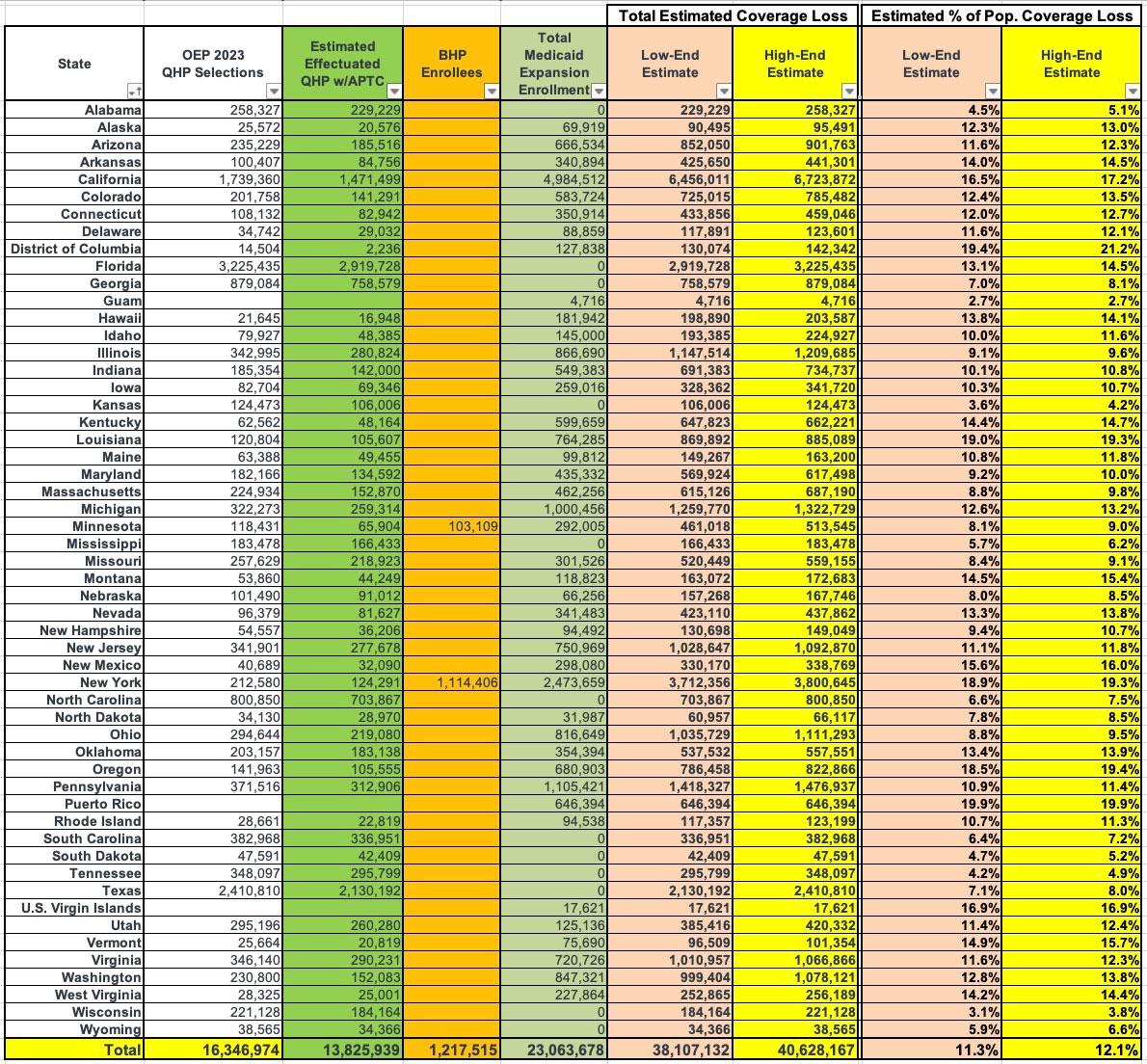How many Americans would lose healthcare coverage under the House GOP's budget in YOUR state?

A few weeks ago I raised an alarm about the federal budget introduced by former Trump Administration OMB Director Russell Vought's think tank, which is being embraced by many House Republicans as their blueprint for a formal budget proposal.
As I noted at the time, Vought's proposed budget would include, among many other horrific things, completely eliminating funding for the ACA's Medicaid expansion program as well as complete elimination of all Advance Premium Tax Credit (APTC) funding for ACA exchange-based individual market enrollees.
I went on to note that if this proposal were to somehow pass the Senate and be signed into law by President Biden (neither of which is likely to happen, to put it mildly), nearly 40 million Americans would lose healthcare coverage as a result nationally.
Below, I've broken that number out by state to give better context about just how draconian such an eventuality would be.
It's important to keep in mind that the numbers below are a bare minimum. They only include the number of people who would lose coverage due specifically to the elimination of ACA Medicaid expansion and APTC (this would also include elimination of the Basic Health Plan funding in Minnesota & New York, since that's also based on APTC funding). They don't include the potentially millions more who would likely lose coverage due to adding work requirement reporting for traditional Medicaid enrollees, eliminating the 50% minimum FMAP (Federal Medical Assistance Percentage) funding requirement for Medicaid budgets and so forth.
The Medicaid expansion data are based on the most recently confirmed enrollment numbers I have for every state & territory. The Qualified Health Plan (QHP) data is based on taking 94% of the QHP selections during the 2023 Open Enrollment Period (this is the February on-exchange QHP effectuation estimate used by CMS in their 2021 report).
I then go with a low-end and high-end estimate: The low end assumes only those actually receiving APTC currently would lose coverage (this averages around 90% nationally, ranging from 16% of effectuated on-exchange QHP enrollees in DC to as high as 97% in Mississippi). the high end assumes everyone on an exchange plan would lose coverage whether they receive APTC subsidies or not.
The latter is a definite possibility since losing ~90% of their enrollees would almost certainly cause most insurance carriers to bail out of the ACA markets entirely, while those remaining would have to dramatically spike premiums to cover those left since they'd still be subject to all of the ACA's "blue leg protections" such as guaranteed issue, community rating, essential health benefits and so forth. It's even possible that the entire off-exchange individual market would be wiped out as well, although I don't have enough state-level data on that to speculate.
With this in mind, here's my estimates of the minimum number of Americans would lose healthcare coverage in each state & territory if the Vought budget proposal were to somehow become the law of the land:
The estimates range from 38.1 - 40.6 million people, or 11.3% - 12.1% of the entire U.S. population.
At the state level, it would range from as little as ~3% of the state population in Wisconsin and Guam to as much as a stunning ~20% or so in DC and Puerto Rico.
However, it's not just U.S. territories which would see a massive hit--the states which would be hardest hit include both blue New York & Oregon (18 - 19% apiece) as well as red Louisiana (19%), Montana & Kentucky (14 - 15% apiece).
That's right: The House GOP budget proposal would kick at least 1 out of every 5 Louisiana residents off their healthcare coverage.
Of course, up to ~15 million Americans are already likely to lose Medicaid coverage due to the impending "Medicaid Unwinding" as the Public Health Emergency winds down and Medicaid/CHIP redeterminations start up again for the first time in nearly 3 years, and some portion of that (several million, I'd imagine) will be those currently enrolled in Medicaid via ACA expansion...but that's an entirely different issue. Around half of those ~15 million people are expected to still be eligible for Medicaid coverage--the main reason they'd be losing coverage is because of the administrative burden/paperwork confusion surrounding having to prove their eligibility after all this time. If Medicaid expansion disappears, so does their eligibility to stay enrolled in it.
How to support my healthcare wonkery:
1. Donate via ActBlue or PayPal
2. Subscribe via Substack.
3. Subscribe via Patreon.




